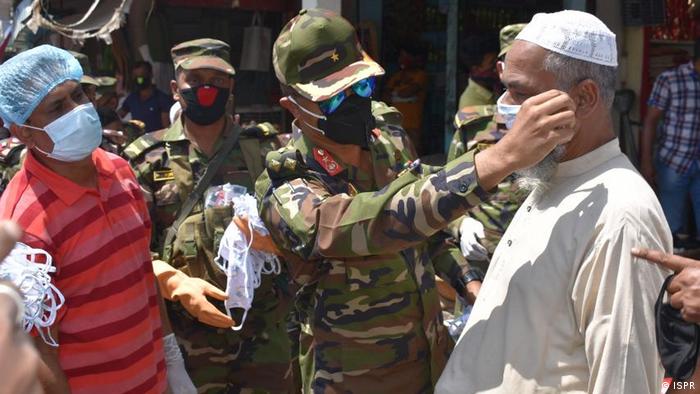While the kits could give Bangladesh a much wider picture of the actual number of COVID-19 infections in the country, some researchers believe the accuracy of the results is questionable.

A group of Bangladeshi scientists says it has developed a rapid coronavirus testing kit that can detect COVID-19 in less than 15 minutes.
The tests, which cost €3 ($3.25) to produce, will be able to detect any positive case, Dr. Bijon Jumar Sil, a lead scientist at the Gonoshasthaya Kendra (GK) health center, told DW. “It uses the dot blot testing technique by looking for antibodies in the blood that are created in response to the virus,” Sil said.
Bangladesh has been struggling to contain its coronavirus outbreak amid a rising number of infections and a shortage of tests. The Muslim-majority country has over 1,500 reported cases and an official death toll of 60, but experts fear that the actual number of infections could be much higher, due to a widespread shortage of tests.
Doctors have also warned that COVID-19 could kill thousands in Bangladesh if authorities fail to contain the virus.
A cost-effective and rapid test could give authorities a clearer picture of the actual number of infections and help stem the spread of the disease.
Coronavirus: Bangladesh hospitals deal with shortage of doctors
Optimism for antibody tests
Sil developed a similar antibody testing kit while he was in Singapore during the SARS outbreak in 2003. He then patented the kit under his name and sold it to the Chinese government.
“I have noticed an 80% similarity between the coronavirus that was spreading in 2003 and COVID-19. My previous experience helped me to quickly develop the new kit,” he said.
Sil and his fellow researchers at the center now hope to be able to provide the first batch of tests to the Bangladeshi government by next week.
“Our initial plan is to produce 100,000 testing kits, which can be used by hospitals and clinics across the country,” Dr. Zafrullah Chowdhury, the founder of GK, told DW. “We won’t sell them to ordinary people.”
Chowdhury believes that his organization has the capacity to produce enough kits to test up to 50 million people.
Read more: Reporting the coronavirus at a Rohingya camp: “Saving lives is now the most important task”
Debate over accuracy
But while Chowdhury believes that the kits are completely accurate, some experts question the precision of the tests. According to Dr. Kamrul Hasan Khan, a leading Bangladeshi physician, international health organizations haven’t approved such dot blot testing kits as they don’t believe that they produce reliable results.
“We need to use kits that have been recognized by international organizations,” said Khan. “Otherwise, there is a high risk of getting false-negative results.”
Dr. Zahidur Rahman, a virologist at the Bangabandhu Sheikh Mujib Medical University, has expressed a similar opinion. He believes that rapid testing kits have a very high error rate.
“Other countries have also created rapid testing kits, but those have been proven to be unreliable, with error rates of around 30%,” Rahman told DW.
He insists that the government should instead expand the facilities needed for the reverse transcription-polymerase chain reaction (RT-PCR) laboratory test, which detects the virus’ genome rather than the antibodies produced to fight it.
“Some private hospitals in our country already have RT-PCR testing facilities, and they should be allowed to carry out more coronavirus tests,” he said. “We should not rely on a test that has a very high rate of false-negative results, as it won’t help to reduce the rate of infection.”
Despite experts’ doubts over accuracy, however, GK researchers like Sil stand by their development, which, if effective, could help Bangladesh curb the spread of the deadly pandemic.
“Our kit won’t exclude any positive case, and that’s the best part of it,” said Sil. “It is very sensitive and will produce a result within 15 minutes after the blood sample is provided.”
Read more: Coronavirus: Bangladesh’s garment industry risks collapse Watch video 02:46









